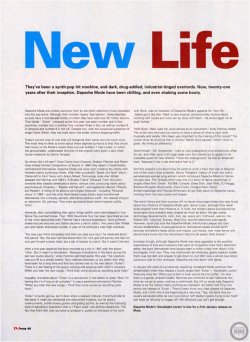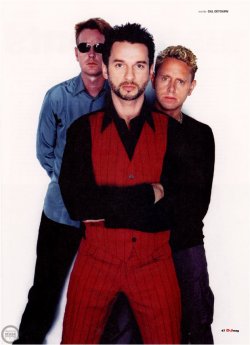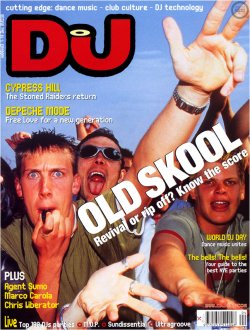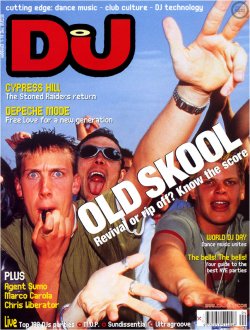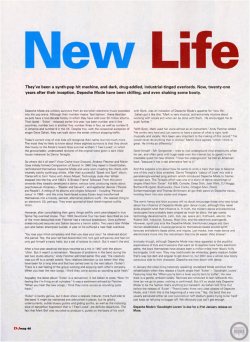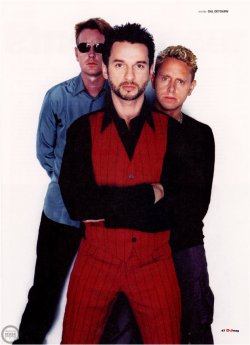You are using an out of date browser. It may not display this or other websites correctly.
You should upgrade or use an alternative browser.
You should upgrade or use an alternative browser.
They've been a synth-pop hit machine, and dark, drug-addled, industrial-tinged overlords. Now, twenty-one years after their inception, Depeche Mode have been chilling, and even shaking some booty." The remix frenzy and Ibiza success will no doubt encourage those who wax lyrical about the influence of Depeche Mode upon dance music, although they never quite pinpoint what that influence is. "
Article in a UK dance magazine ahead of the release of Goodnight Lovers, (re-)presenting Depeche Mode as players in the present-day dance music world. The article gives the reader a crash course in Depeche Mode history, bearing in mind the unusual audience. Exciter's remixes are enthusiastically discussed, but the author is careful not to overstate their influence upon dance music as some have.
Depeche Mode are unlikely survivors from an era when electronic music exploded into the pop era. Although their moniker means 'fast fashion', these Basildon ex-pats have a two-decade history in which they have sold over 50 million albums. Their latest - 'Exciter' - released earlier this year, has been number one in five countries, number two in another five, number three in four, as well as number 8 in America and number 9 in the UK. Despite this, with the occasional exception of singer Dave Gahan, they can walk down the street without stopping traffic.
Today's current crop of club kids will recognise their name, but not much more. The most they're likely to know about these eighties survivors is that they shook their booty to the Mode's recent Ibiza summer anthem 'I Feel Loved', in which the groove-laden, understated textures of the original were given a dark tribal-house makeover by Danny Tenaglia.
So where did it all start? Vince Clark (now Erasure), Andrew Fletcher and Martin Gore initially formed Composition of Sound. In 1980 they roped in David Gahan, rechristened themselves Depeche Mode and were soon invading the charts with insanely catchy synth-pop ditties. After their successful 'Speak and Spell' album, Clarke left to form Yazoo with Alison Moyet. Technology dude Alan Wilder stepped into the fray and 1982's 'A Broken Frame' followed. From this point onwards they steadily developed a darker, serious tone, producing tracks about psychosexual chicanery - 'Master and Servant' - and egalitarian desires ('People are People'). A string of hit albums and singles followed - including 'Personal Jesus' in 1989 - and the once fresh-faced cutesy Essex boys transformed themselves into a moody, earnest, alternative stadium outfit - the nearest thing to an electronic U2, perhaps. They even sported all-black fetish inspired outfits. Hmm.
However, after consolidating their gains things swiftly went pear-shaped in true Spinal Tap overload stylee. Their 1993 Devotional tour has been described as one of the most debauched ever. Fletcher had a nervous breakdown, Gore suffered stress-induced seizures and Gahan became a heroin addict. Two years later Wilder quit and Gahan attempted suicide. A year on he suffered a near fatal overdose.
"You lose your mind completely and then you lose your soul," he observed about this period. Yep, the poor lad had descended into rock god self-parody and had not only got himself a nasty habit, but a set of tattoos to match. But it wasn't the end.
After a four-year absence the boys returned as a trio in 1997 with the album 'Ultra'. But it wasn't a reinvention. "Because of problems in the band during the last two studio albums," Andy Fletcher admitted earlier this year, "the creativity was cut off to a certain extent. Now relations between us are better than they have been for a long time and that has carried over to the next album ('Exciter'). There is a real feeling of the group working and enjoying each other's company. When you hear the new songs, I think they come across as sounding quite fresh."
Arguably, the latest album 'Exciter' is a reinvention. It led Gahan to state: "Now I'm feeling like I'm firing on all cylinders." It was a sentiment echoed by Fletcher: "When you hear the new songs, I think they come across as sounding quite fresh."
'Exciter' is hardly genius, but it does show a relaxed, maturer, more fluid side to the band. It might be restrained and airbrushed in places, but its glitchy undercurrents, subtle bluesy guitars and gliding synths, as well as the motoring slice of dancefloor hypnotism that is 'I Feel Loved', are definite departures. The fact that Mark Bell was recruited to produce it, purely on the basis of his work with Bjork, was an indication of Depeche Mode's appetite for 'new life'. Gahan put it like this: "Mark is very musical, and extremely intuitive about working with vocals and what can be done with them. He encouraged me to push further."
"With Bjork, Mark used her voice almost as an instrument," Andy Fletcher added. "He works very hard and just seems to have a sense of what is right, both musically and vocally. He's been very important to the making of this record." "He would never do anything that is cliched," Martin Gore agreed, "which I think is great. He thinks so differently."
Gore himself - Mr Songwriter - tries to visit underground vinyl emporiums when he can, and often parts with huge wads over the internet (so to speak) in his insatiable quest for new choons. "I love the underground", he told an American hack, "because it has a real alternative feel to it".
And this explains a lot about how he came to write a track that was to become one of this year's Ibiza smashes. Danny Tenaglia's 'Labour of Love' mix was a painstakingly-worked prog anthem which introduced Depeche Mode to fresher, younger ears. The Tenaglia effort was one of a slurry of dance reworkings of singles lifted from 'Exciter'. Kid 606, Console, Deep Dish, Josh Wink, DJ Muggs, Betrand Burgalat, Dave Clarke, Octagon Man, Flood, Schlammpeitziger and Thomas Brinkmann all got their paws on Depeche tracks, twisting them into new styles and shapes.
The remix frenzy and Ibiza success will no doubt encourage those who wax lyrical about the influence of Depeche Mode upon dance music, although they never quite pinpoint what that influence is. In truth, the modern dance and electronica landscapes have probably been shaped as much by disco, the gay scene, technology developments, Latin, dub, rap, space jazz, Kraftwerk, electro, the Roland 303, industrial, Ecstasy, Brian Eno, and the electronic avant-garde. However, synth pop acts like Depeche Mode, the Human League and Gary Numan established a musical persona for themselves based around synth textures and electric beats alone, and maybe, just maybe, that made dance and electronica's move into the mainstream that tiny bit easier. Who knows?
Ironically though, although Depeche Mode may have appealed to the youthful explorations of DJs and musicians that went on to explore more funky electronic paths, the boys themselves have always been a million miles from Ibiza's fluffy bra brigade. Until now. They may traditionally be white-boy, geeky stadium fodder that's way too dark and angular to get down to, but 2001 saw a whole new booty conscious side to their character. Depeche are now down with dance.
In January the clean-living (relatively speaking) revitalised Mode continue their rehabilitation when they release a fourth single from 'Exciter' - 'Goodnight Lovers'. Featuring lines like "When you're born a lover you're born to suffer", the new track is a gentle, ambient lullaby. Remixes are rumoured to lean leftwards this time (as we go to press, nothing is confirmed). But it'll no doubt help Depeche Mode to be the fashion that's anything but transient. As Gahan told Time Out before the release of 'Exciter': "There's been three very clear phases of Depeche Mode, and I think this is the beginning of a new one." Yep, the band that are usually perceived either as cool survivors or naff stadium geeks trying to be 'hard' just keep on refusing to bugger off. We obviously just can't get enough.
Depeche Mode's 'Goodnight Lovers' is due for a 21st January release on Mute.
Last edited:

